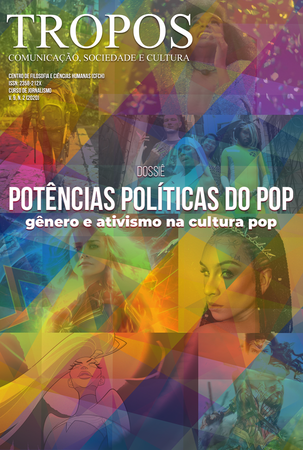VISIBILITIES AND HETEROTOPIAS IN THE MARVEL CINEMATIC UNIVERSE
DECOLONIAL FEMINIST READINGS
Keywords:
Black Panther, Captain Marvel, Feminist Film Theories, Coloniality of Gender, Feminist HeterotopiasAbstract
This article investigates the crossings of the notion of Coloniality of Gender, elaborated by María Lugones (2007; 2014) in the diegeses of two superproductions of the Marvel Cinematic Universe, Black Panther (2018) and Captain Marvel (2019), starting from the concept of “heterotopias” by Michel Foucault (2003), and the work of Margareth Rago (2006) on“ feminist heterotopias ”. It explores the possibilities offered by film materiality to weave feminist readings. In these movies, especially with regard to the visibility of female subjects, it is remarkable how the characters, in their narrative functions and their performances, for example, tension certain hegemonic patterns and negotiate with neoliberal structures. Intertwining utopian temporalities and spatialities with real historical and territorial memories, they mobilize visual signs and discourses that allows us to think about possible feminist heterotopies of collective resistance in contemporary contexts. In the effort to historicize these experiences of representation, Feminist Film Theories Cinema do not fully embrace the dimension of the constitutive coloniality of “gender”. This work starts with a brief theoretical review of this field, seeking to expand to the intersectional approach a problematization of the crossings of coloniality in Hollywood pop culture, in order to find horizons for a pluriversal feminist perspective.
References
BERTH, Joice. Empoderamento. São Paulo: Sueli Carneiro; Pólen, 2019.
BESSA, Karla. “Como cheguei a ser o que sou”? Uma estética da torção em filmes das décadas de 60 e 70. Revista Estudos Feministas, vol.25, n.1, pp.291-313, 2017. Disponível em: http://www.scielo.br/scielo.php?script=sci_arttext&pid=S0104026X2017000100291&lng=e.n&nrm=iso. Acesso em 10 out. 2019.
CAPITÃ Marvel. Direção: Anna Boden e Ryan Fleck. Roteiro: Anna Boden; Ryan Fleck; Geneva Robertson-Dworet. Elenco: Brie Larson; Samuel L. Jackson; Annette Bennin, Lashana Lynch e outros. Marvel Studios, 2019. Color: 123 min.
FEDERICI, Silvia. A modo de introducción: marxismo y feminismo – historia y conceptos. In: El patriarcado del salario: críticas feministas al marxismo. Tradução de María Aránzazu Catalán Altuna, Carlos Fernández Guervós e Paula Martín Ponz. Madrid: Traficantes de Sueños, 2018.
FOUCAULT, Michel. Outros Espaços. In: Ditos e escritos, vol. 3. Estética: Literatura e Pintura, Música e Cinema. Rio de Janeiro: Forense Universitária, 2003, pp. 411-422.
FRASER, Nancy, O Feminismo, o capitalismo e a Astúcia da História. Tradução de Anselmo da Costa Filho e Sávio Cavalcante. Mediações: Revista de Ciências Sociais, Londrina, v. 14, n. 2, p. 11-33, 2009 http://www.uel.br/revistas/uel/index.php/mediacoes/article/view/4505. Acesso 10 dez. 2019.
HASKELL, Molly. From reverence to rape: The treatment of women in the movies. New York: Holt, Rinehart and Winston, 1974.
HOOKS, bell. Olhares Negros: Raça e Representação. São Paulo: Elefante, 2019.
LAURETIS, Teresa de. Technologies of Gender: Essays on Theory, Filme and Fiction. Bloomington: Indiana University Press, 1987.
LUGONES, Maria. Heterosexualism and the Colonial/Modern Gender System. Hypatia, v. 22, n. 1, p. 186-209. 2007. Disponível em: https://onlinelibrary.wiley.com/doi/abs/10.1111/j.1527-2001.2007.tb01156.x. Acesso em 20 jan. 2020.
LUGONES, Maria. Rumo a um feminismo descolonial. Estudos Feministas. Florianópolis, 22(3), 320, 2014. Disponível em: https://periodicos.ufsc.br/index.php/ref/article/view/36755. Acesso em 02 dez. 2019.
MANEVY, Alfredo. Hollywood: A versatilidade do gênio do sistema. In: BAPTISTA, Mauro; MASCARELLO, Fernando (orgs.). Cinema mundial contemporâneo. Campinas: Papirus: 2008.
MATOS, Marlise. Movimento e teoria feminista: é possível reconstruir a teoria feminista a partir do movimento sul global. Revista de Sociologia Política. v. 18, nº36, p. 67-92. 2010.
MOHANTY, Chandra Talpade. Bajo los ojos de odcidente. Academia feminista y discurso colonial. In: SUARÉZ NAVAZ, L; HERNÁNDEZ, A (ed.) Descolonizando El Feminismo: teorias y prácticas desde los márgenes. Madrid: Editorial Cátedra, 2008
MULHER-MARAVILHA. Direção: Patty Jenkins. Los Angeles: Warner Bros, 2017. 1 disco
blu-ray (141 min.). Título original: Wonder Woman.
MULVEY, Laura. From a faculty seminar with Laura Mulvey: reflections on visual pleasure. In: New Review of Film and Television Studies. nº 15, v. 4., 2017. Disponível em: http://dx.doi.org/10.1080/17400309.2017.1377923. Acesso: 20 abr. 2019.
McSWEENEY, Terrence. Avengers Assemble!: Critical Perspectives on the Marvel Universe. Nova York: Columbia University Press, 2018.
MULVEY. Laura. Visual Pleasure and Narrative Cinema. In: Film Theory and Criticism: Introductory Readings. Eds. Leo Braudy and Marshall Cohen. New York: Oxford UP, 833-44.
OYĚWÙMÍ, Oyèrónké. Conceituando o gênero: os fundamentos eurocêntricos dos conceitos
feministas e o desafio das epistemologias africanas. CODESRIA Gender Series. Volume 1, Dakar, CODESRIA, 2004, p. 1-8. Disponível em: https://filosofia-africana.weebly.com/uploads/1/3/2/1/13213792/oy%C3%A8r%C3%B3nk%C3%A9_oy%C4%9Bw%C3%B9m%C3%AD_-_conceitualizando_o_g%C3%AAnero._os_fundamentos_euroc%C3%AAntrico_dos_conceitos_feministas_e_o_desafio_das_epistemologias_africanas.pdf. Acesso em 11 set. 2019.
PANTERA Negra. Direção: Ryan Coogler. Produção: Kevin Feig. Roteiro: Jack Kirby, Joe Robert Coole e Stan Lee. Elenco: Chadwick Boseman, Danai Gurira, Michael B. Jordan, Lupita Nyong’o, Andy Serkis, Angela Basset e outros. Marvel Studios, 2018. Color. 134 min.
RAGO, Margareth. Foucault, la Subjetividad y las Heterotopías Feministas, 2006. Disponível em: https://historiacultural.mpbnet.com.br/artigos.genero/margareth/RAGO_MargarethFoucault_la_Subjetividad_y_las_Heterotopias_feministas.pdf. Acesso em 05. dez. 2019.
SOBCHACK, Vivian. Carnal Thoughts: Embodiment and moving image culture. Berkeley: University of California Press, 2004.
Downloads
Published
How to Cite
Issue
Section
License
Transferência de direitos autorais:
Declaro que após aprovado para publicação a Revista Tropos editada pela Universidade Federal do Acre (UFAC), passará a ter os direitos autorais do trabalho, que se tornarão propriedade exclusiva da Revista, sendo permitida a reprodução total ou parcial desde que devidamente referenciada.

